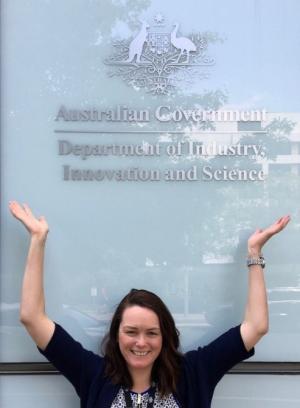Jill, 2019–20
Jill
What were you researching before you started as a Science Policy Fellow?
My research sought to identify new molecular targets in lung cancer for the design of targeted therapeutics. I was using Next Generation sequencing of lung cancers to identify candidate mutations, and then assess their role in developing or progressing lung carcinogenesis with gene editing (e.g. CRISPR-Cas9) in cell-based models of lung cancer.
What policy area are you working on through the Science Policy Fellowship Program?
I have been placed in the Department of Industry, Innovation and Science and will undertake two 6-month placements. My first is with the Spatial Data Policy Section, which works to promote location data priorities and the importance of access to and use of high quality, authoritative national level spatial data. Integrating spatial data with other big data (such as infrastructure, socio-economic, and IoT sensor data) can enhance place-based decision-making and policy development. I’ve joined the team at an exciting time as they work with other government agencies and industry stakeholders to develop strategies and principles for the development of spatially enabled digital twins for the built and natural environment. The second placement is within the Office of Innovation and Science Australia, which supports Innovation and Science Australia, an independent statutory board that provides strategic whole-of-government advice to the Government on all science, research and innovation matters.
How has your research background helped you contribute to policy development?
Being able to write well has been critical – particularly being able to write (and think) succinctly and clearly. I actually enjoy grant writing (up to point, of course!), and I draw a lot of similarities between grant writing and some of what I write now, particularly ministerial briefs. Another big skill I am continually using is thinking critically and ensuring there is sound evidence behind my work. Further to that, having a fresh perspective on things and demonstrating strategic oversight, having attention to detail and being able to work well under pressure are other research skills being appreciated in the APS. While I knew nothing about spatial data before I started this program, with the efforts to digitise and integrate location information, I have been able draw a lot from my research experience in generating and dealing with ‘big data’ in cancer genomics.
How has the program changed your career aspirations?
It has given me first-hand experience in science policy and the process of policy making, which no amount of reading up about the topic could provide. For me personally, I needed this experience to be confident about science policy as a career change. As a Science Policy Fellow, we are given a lot of extra opportunities not usually offered to policy officers, such as meeting with senior Questacon staff and attending Science Meets Parliament. Additionally, the program is helping us to build up our networks around the APS, which is incredibly useful for mentoring and general advice both now and in the future. All of these experiences are broadening my appreciation for the diversity of career options that are available within government where you can still be contributing to science, just at a much higher level.
What is your favourite part about working in a policy role in the Australian Public Service?
I feel like I am still contributing to science and research in Australia but now from a top-down perspective. I am getting opportunities to contribute to national-level strategies and initiatives, which will have a much bigger impact on science and research in Australia than the incremental advances in knowledge I may have contributed to from the lab bench. I am also really enjoying the problem-solving aspect of policy – particularly difficult policy problems with nuances and conflicting interests.

